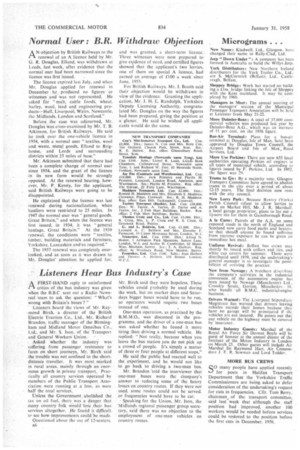Listeners Hear B us Industry's Case
Page 40

If you've noticed an error in this article please click here to report it so we can fix it.
I-I A FIRST-HAND reply to uninformed
critics of the bus industry was given when the B.B.0 sent out a Radio Newsreel team to ask the question: "What's wrong with Britain's buses ? "
Listeners heard the views of Mr. Raymond Birch, a director of the British Electric Traction Co.. Ltd.. Mr. Richard Brandon. traffic manager of the Birmingham and Midland Motor Omnibus Co., Ltd., and Mr. S. Ron. of the Transport and General Workers Union.
Asked 'whether the industry was suffering from passenger resistance to fares on short journeys, Mr. Birch said the trouble was not confined to the shortdistance traveller. It was most marked in rural areas, mainly through an enormous growth in private transport. Practically all country services operated by members of the Public Transport Association were running. at .a loss, as were half the total services.
Unless the Government abolished the tax on oil fuel, there was a danger that many country folk would lose .their hus services altogether. He found it difficult te see bow improvements could he made.
Questioned about the use of 12-seaters.
a6
Mr. Birch said they were hopeless. These vehicles could probably be used during the week, but on market days and Saturdays bigger buses would have to be run, so operators would require . two buses instead of one.
One-man operation, as practised by the B.M.M.O., was discussed in the programme. and the driver of a one-man bus was asked whether he found it more tiring than driving a normal vehicle. He replied: "Not really, because when you leave the bus station you do not pick up a crowd of people. It's simply a matter of three or four people at different stops."
He said the public had reacted well to the eiperiment, and he would not like to go back to driving a two-man bus.
Mr. Brandon told the interviewer that one-man buses were the company's answer to reducing some of the heavy losses on country routes. If they were not used, some routes could not be served. or frequencies would have to be cut.
Speaking for the Union, Mr. [son, the Midlands regional passenger group secretary, said there was no objection to the employment of one-man vehicles , on country routes.




































































































